Foreign News
Why massive sex tape leak could be a ploy for power in Equatorial Guinea
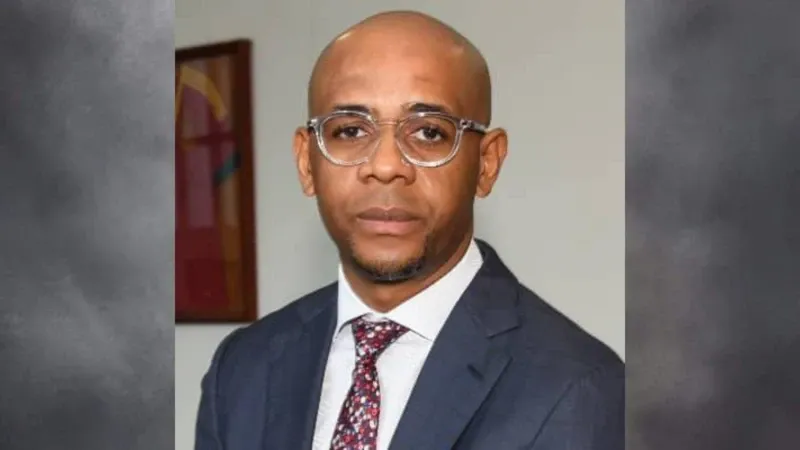
What the rest of the world sees as a sex tape scandal could in fact be the latest episode in the real-life drama over who will become Equatorial Guinea’s next president.
Over the past fortnight, dozens of videos – estimates range from 150 to more than 400 – have been leaked of a senior civil servant having sex in his office and elsewhere with different women. They have flooded social media, shocking and titillating people in the small central African country and beyond.
Many of the women filmed were wives and relatives of people close to the centre of power. It appears some were aware they were being filmed having sex with Baltasar Ebang Engonga, who is also known as “Bello” because of his good looks.
All this is hard to verify as Equatorial Guinea is a highly restricted society where a free press does not exist. But one theory is that the leaks were a way to discredit the man at the centre of the storm.
Mr Engonga is a nephew of President Teodoro Obiang Nguema and one of those thought to be hoping to replace him.
Obiang is the world’s longest-serving president having been in power since 1979. The 82-year-old has overseen an economic boom that has turned to bust as a result of the now-dwindling oil reserves.
There is a small, extremely wealthy elite, but many of the 1.7 million people in the country live in poverty.
Obiang’s administration is heavily criticised for its human rights record, including arbitrary killings and torture, according to a US government report.
It has also had its fair share of scandals – including the revelations about the lavish lifestyle of one of the president’s sons, now vice-president, who once owned a $275,000 (£210,000) crystal-encrusted glove worn by Michael Jackson.
Despite regular elections, there is no real opposition in Equatorial Guinea as activists have been jailed and exiled and those with designs on office are closely monitored.

Politics in the country is really about palace intrigue and this is where the scandal involving Mr Engonga fits in.
He was the head of the National Financial Investigation Agency, and worked on tackling crimes such as money laundering. But it turned out he himself was under investigation. He was arrested on 25 October accused of embezzling a huge sum of money from state coffers and depositing it in secret accounts in the Cayman Islands. He has not commented on the accusation.
Mr Engonga was then taken to the infamous Black Beach prison in the capital, Malabo, where it is alleged that opponents of the government are subjected to brutal treatment. His phones and computers were seized and a few days later the intimate videos started appearing online.
The first reference the BBC has found to them on Facebook is from 28 October on the page of Diario Rombe, a news site run by a journalist in exile in Spain, which said that “social networks exploded with the leaking of explicit images and videos”.
A post on X the following day referred to a “monumental scandal shaking the regime” as “pornographic videos flood social media”.
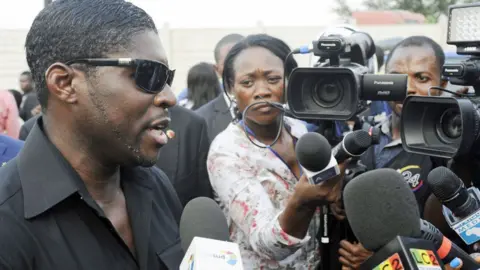
But they are believed to have originally appeared one-by-one a few days earlier on Telegram, on one of the platform’s channels known for publishing pornographic images.
They were then downloaded on to people’s phones and shared among WhatsApp groups in Equatorial Guinea, where they caused a storm.
Mr Engonga was quickly identified along with some of the women in the videos, including relatives of the president and wives to ministers and senior military officials.
The government was unable to ignore what was going on and on 30 October Vice-President Teodoro Obiang Mangue (once owner of the Michael Jackson glove) gave telecoms companies 24 hours to come up with ways to stop the spread of the clips.
“We cannot continue to watch families fall apart without taking any action, he wrote on X.
“In the meantime, the origin of these publications is being investigated to find the author or authors and make them answer for their actions.”
As the computer equipment was in the hands of the security forces, suspicion has fallen on someone there, who, perhaps, sought to trash Mr Engonga’s reputation ahead of a trial.
The police have called on women to come forward to open a case against Mr Engonga for the non-consensual sharing of intimate images. One has already announced that she is suing him.
What is not clear is why Mr Engonga made the recordings. But activists have put forward what could be other motives behind the explosive leak.
As well as being related to the president, Mr Engonga is the son of Baltasar Engonga Edjo’o, the head of the regional economic and monetary union, Cemac, and very influential in the country.
“What we are seeing is the end of an era, the end of the current president, and there is a succession [question] and this is the internal fighting we are seeing,” said Equatoguinean activist Nsang Christia Esimi Cruz, now living in London.
Speaking to the BBC Focus on Africa podcast, he alleged that Vice-President Obiang was trying to politically eliminate “anyone who could challenge his succession”.
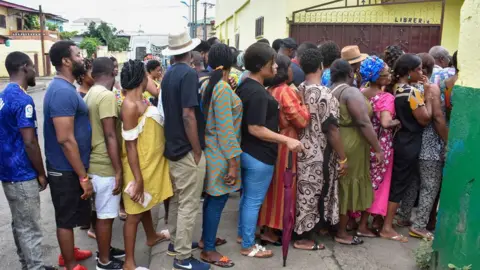
The vice-president, along with his mother, are suspected to be pushing aside anyone who threatens his path to the presidency, including Gabriel Obiang Lima (another son of President Obiang from a different wife), who was oil minister for 10 years and then moved to a secondary government role.
Those in the elite are thought to know things about each other that they would rather was not made public, and videos have been used in the past to humiliate and discredit a political opponent.
There are also frequent accusations of coup plotting, which further fuels paranoia.
But Mr Cruz also alleges that the authorities want to use the scandal as an excuse to crack down on social media, which is how a lot of information about what is really going on in the country gets out.
In July, the authorities temporarily suspended the internet after protests broke out on the island of Annobón.
For him, the fact that a high-ranking official was having sex outside of marriage was not surprising as it was part of the decadent lifestyle of the country’s elite.
The vice-president, who himself has been convicted of corruption in France and has had lavish assets seized in various countries, wants to be seen as the man cracking down on graft and wrong-doing at home.
Last year, for example, he ordered the arrest of his half brother over allegations he sold a plane owned by the state airline.
But in this case, despite the vice-president’s efforts to stop the spread of the clips, they continue to be viewed.
This week, he tried to appear more resolute calling for the installation of CCTV cameras in government offices “to combat indecent and illicit acts”, the official news agency reported.
Saying that the scandal had “denigrated the image of the country” he ordered that any officials found engaging in sex acts at work would be suspended as this was a “flagrant violation of the code of conduct”.
He was not wrong that the story has attracted a lot of outside interest.
Judging by Google’s data, search enquiries that include the country’s name have shot up since the beginning of this week.
On Monday, on X, “Equatorial Guinea” was one of the top trending terms in Kenya, Nigeria and South Africa – surpassing at times interest in the US election.
This has left some activists who have been trying to tell the world about what is really going on in the country frustrated.
“Equatorial Guinea has much bigger problems than this sex scandal,” said Mr Cruz, who works for a rights organisation called GE Nuestra.
“This sex scandal for us is just a symptom of the illness, it’s not the illness itself. It just shows how corrupt the system is.”
[BBC]
Foreign News
Rights groups condemn new record number of executions in Saudi Arabia

Saudi Arabia has surpassed its record for the number of executions carried out annually for a second year in a row.
At least 347 people have now been put to death this year, up from a total of 345 in 2024, according to the UK-based campaign group Reprieve, which tracks executions in Saudi Arabia and has clients on death row.
It said this was the “bloodiest year of executions in the kingdom since monitoring began”.
The latest prisoners to be executed were two Pakistani nationals convicted of drug-related offences.
Others put to death this year include a journalist and two young men who were children at the time of their alleged protest-related crimes. Five were women.
But, according to Reprieve, most – around two thirds – were convicted of non-lethal drug-related offences, which the UN says is “incompatible with international norms and standards”.
More than half of them were foreign nationals who appear to have been put to death as part of a “war on drugs” in the kingdom.
The Saudi authorities have not responded to the BBC’s request for comment on the rise in executions.
“Saudi Arabia is operating with complete impunity now,” said Jeed Basyouni, Reprieve’s head of death penalty for the Middle East and North Africa. “It’s almost making a mockery of the human rights system.”
She described torture and forced confessions as “endemic” within the Saudi criminal justice system.
Ms Basyouni called it a “brutal and arbitrary crackdown” in which innocent people and those on the margins of society have been caught up.
On Tuesday, a young Egyptian fisherman, Issam al-Shazly, was executed. He was arrested in 2021 in Saudi territorial waters and said he had been coerced into smuggling drugs.
Reprieve says 96 of the executions were solely linked to hashish.
“It almost seems that it doesn’t matter to them who they execute, as long as they send a message to society that there’s a zero-tolerance policy on whatever issue they’re talking about – whether it’s protests, freedom of expression, or drugs,” said Ms Basyouni.
There has been a surge of drug-related executions since the Saudi authorities ended an unofficial moratorium in late 2022 – a step described as “deeply regrettable” by the UN human rights office.
Speaking anonymously to the BBC, relatives of men on death row on drugs charges have spoken of the “terror” they’re now living in.
One told the BBC: “The only time of the week that I sleep is on Friday and Saturday because there are no executions on those days.”
Cellmates witness people they have shared prison life with for years being dragged kicking and screaming to their death, according to Reprieve.

The de facto ruler of Saudi Arabia, Mohammed bin Salman – who became crown prince in 2017 – has changed the country profoundly over the past few years, loosening social restrictions while simultaneously silencing criticism.
In a bid to diversify its economy away from oil, he has opened Saudi Arabia up to the outside world, taken the religious police off the streets, and allowed women to drive.
But the kingdom’s human rights record remains “abysmal”, according to the US-based campaign group Human Rights Watch, with the high level of executions a major concern. In recent years, only China and Iran have put more people to death, according to human rights activists.
“There’s been no cost for Mohammed bin Salman and his authorities for going ahead with these executions,” said Joey Shea, who researches Saudi Arabia for Human Rights Watch. “The entertainment events, the sporting events, all of it is continuing to happen with no repercussions, really.”
According to Reprieve, the families of those executed are usually not informed in advance, or given the body, or informed where they have been buried.
The Saudi authorities do not reveal the method of execution, although it is believed to be either beheading or firing squad.
In a statement sent to the BBC, the UN’s special rapporteur on extrajudicial, summary or arbitrary executions, Dr Morris Tidball-Binz, called for an immediate moratorium on executions in Saudi Arabia with a view to abolition,.
He also pressed for “full compliance with international safeguards (including effective legal assistance and consular access for foreign nationals), prompt notification of families, the return of remains without delay and the publication of comprehensive execution data to enable independent scrutiny”.
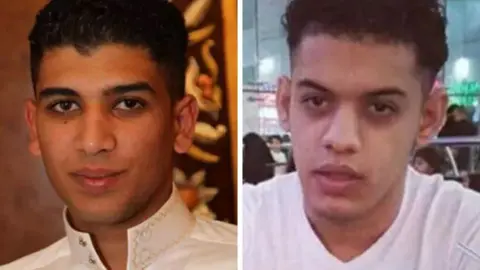
Among the Saudi nationals executed this year were Abdullah al-Derazi and Jalal al-Labbad, who were both minors at the time of their arrest.
They had protested against the government’s treatment of the Shia Muslim minority in 2011 and 2012, and participated in the funerals of people killed by security forces. They were convicted of terrorism-related charges and sentenced to death after what Amnesty International said were grossly unfair trials that relied on torture-tainted “confessions”. UN human rights experts had called for their release.
The UN also condemned the execution in June of journalist Turki al-Jasser, who had been arrested in 2018 and sentenced to death on charges of terrorism and high treason based on writings he was accused of authoring.
“Capital punishment against journalists is a chilling attack on freedom of expression and press freedom,” Unesco’s Director-General, Audrey Azoulay, said.
Reporters Without Borders said he was the first journalist to be executed in Saudi Arabia since Mohammed bin Salman came to power, although another journalist, Jamal Khashoggi, was murdered by Saudi agents at the Saudi consulate in Istanbul in 2018.
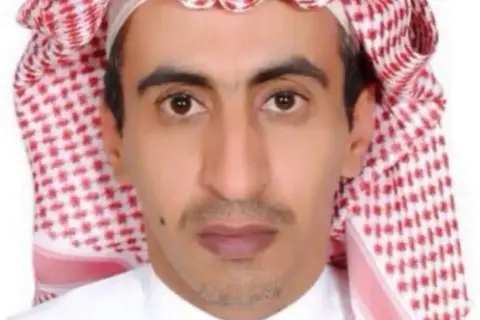
Last December, UN experts wrote to the Saudi authorities to express concern over a group of 32 Egyptians and one Jordanian national sentenced to death on drugs charges, and their “alleged absence of legal representation”. Since then, most of the group have been executed.
A relative of one man put to death earlier this year said he had told her that people were being “taken like goats” to be killed.
The BBC has approached the Saudi authorities for a response to the allegations but has not received one.
But in a letter dated January 2025 – in reply to concerns raised by UN special rapporteurs – they said Saudi Arabia “protects and upholds” human rights and that its laws “prohibit and punish torture”.
“The death penalty is imposed only for the most serious crimes and in extremely limited circumstances,” the letter stated. “It is not handed down or carried out until judicial proceedings in courts of all levels have been completed.”
[BBC]
Foreign News
US to host Qatari, Turkish and Egyptian officials for Gaza ceasefire talks
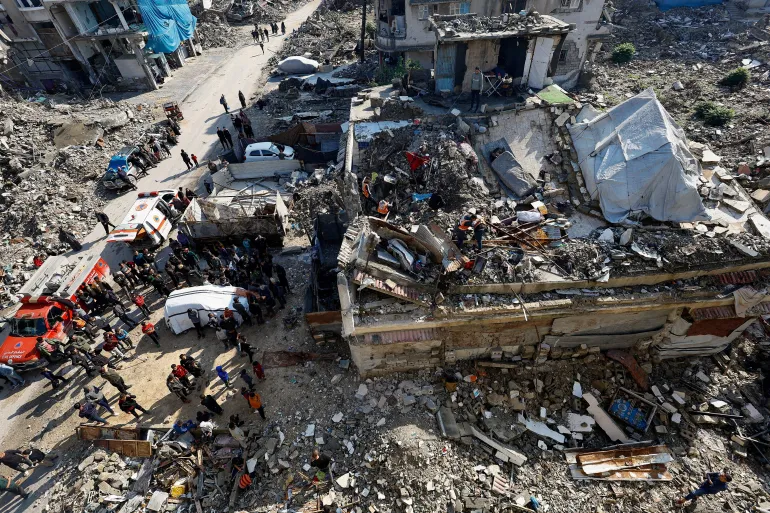
The United States Middle East envoy, Steve Witkoff, will hold talks in Miami, Florida, with senior officials from Qatar, Egypt and Turkiye as efforts continue to advance the next phase of the Gaza ceasefire, even as Israel repeatedly violates the truce on the ground.
A White House official told Al Jazeera Arabic on Friday that Witkoff is set to meet representatives from the three countries to discuss the future of the agreement aimed at halting Israel’s genocidal war on Gaza.
Axios separately reported that the meeting, scheduled for today [Friday], will include Qatari Prime Minister and Foreign Minister Sheikh Mohammed bin Abdulrahman bin Jassim Al Thani, Turkish Foreign Minister Hakan Fidan and Egyptian Foreign Minister Badr Abdelatty.
At the same time, Israel’s public broadcaster, quoting an Israeli official, said Prime Minister Benjamin Netanyahu is holding a restricted security consultation to examine the second phase of the ceasefire and potential scenarios.
That official warned that Israel could launch a new military campaign to disarm Hamas if US President Donald Trump were to disengage from the Gaza process, while acknowledging that such a move was unlikely because Trump wants to preserve calm in the enclave.

Despite Washington’s insistence that the ceasefire remains intact, Israeli attacks have continued almost uninterrupted, as it continues to renege on the terms of the first phase and blocks the free flow of desperately needed humanitarian aid into the besieged Palestinian territory.
[Aljazeera]
Foreign News
Ex-Nascar driver and his family among seven killed in US plane crash

A former Nascar driver and his family were among the seven people killed in a plane crash at a regional airport in North Carolina, the car-racing organisation has said.
A highway patrol spokesman said people on the ground confirmed that Greg Biffle was among those who boarded the plane.
The Cessna C550 crashed while landing at Statesville Regional Airport around 10:20 local time (15:20GMT), officials investigating the incident told reporters.
“Greg was more than a champion driver, he was a beloved member of the NASCAR community, a fierce competitor, and a friend to so many,” Nascar said in a statement where it confirmed Biffle had died along with his wife, daughter, son, and three others.

“His passion for racing, his integrity, and his commitment to fans and fellow competitors alike made a lasting impact on the sport,” the company added.
Beyond the racetrack, Biffle was remembered for helping in North Carolina in the aftermath of last year’s Hurricane Helene, when he used his personal helicopter to rescue stranded residents and deliver supplies.
Tributes to the former racer poured in on Thursday.
“Heartbreaking news out of Statesville,” North Carolina Governor Josh Stein posted on X. “Beyond his success as a NASCAR driver, Greg Biffle lived a life of courage and compassion and stepped up for western North Carolina after Hurricane Helene.”
Motorsport YouTuber Garrett Mitchell wrote on Facebook that Biffle and his family were on their way to spend the afternoon with him.
“Unfortunately, I can confirm Greg Biffle, his wife Cristina, daughter Emma, and son Ryder were on that plane… because they were on their way to spend the afternoon with us,” he wrote on Facebook. “We are devastated. I’m so sorry to share this.”
Statesville Airport Director John Ferguson described the aircraft as a corporate jet and said it was already engulfed in flames when he arrived on the scene.
The Cessna C550 aircraft is owned by a private company associated with Biffle, CBS, the BBC’s US partner, reported.
The jet took off around 10:06 local time and was in the air briefly before it crashed on the east end of the runway.
Authorities are investigating the cause of the crash.
Statesville Airport will remain closed until further notice as crews clear debris off the runway, Mr Ferguson told reporters.
Officials did not provide any information about deaths or people aboard the aircraft during their first media conference.
The National Transportation Safety Board, which is leading the investigation has sent in a team to investigate the fatal crash.
The Statesville Regional Airport (KSVH) is owned by the City of Statesville, which is about 45 minutes north of Charlotte.
It also provides aviation facilities for Fortune 500 companies and several Nascar racing teams.
[BBC]
-

 Midweek Review6 days ago
Midweek Review6 days agoHow massive Akuregoda defence complex was built with proceeds from sale of Galle Face land to Shangri-La
-

 News5 days ago
News5 days agoPope fires broadside: ‘The Holy See won’t be a silent bystander to the grave disparities, injustices, and fundamental human rights violations’
-

 News5 days ago
News5 days agoPakistan hands over 200 tonnes of humanitarian aid to Lanka
-

 Business4 days ago
Business4 days agoUnlocking Sri Lanka’s hidden wealth: A $2 billion mineral opportunity awaits
-

 News6 days ago
News6 days agoBurnt elephant dies after delayed rescue; activists demand arrests
-

 Editorial6 days ago
Editorial6 days agoColombo Port facing strategic neglect
-

 News4 days ago
News4 days agoArmy engineers set up new Nayaru emergency bridge
-

 News6 days ago
News6 days agoSri Lanka, Romania discuss illegal recruitment, etc.













